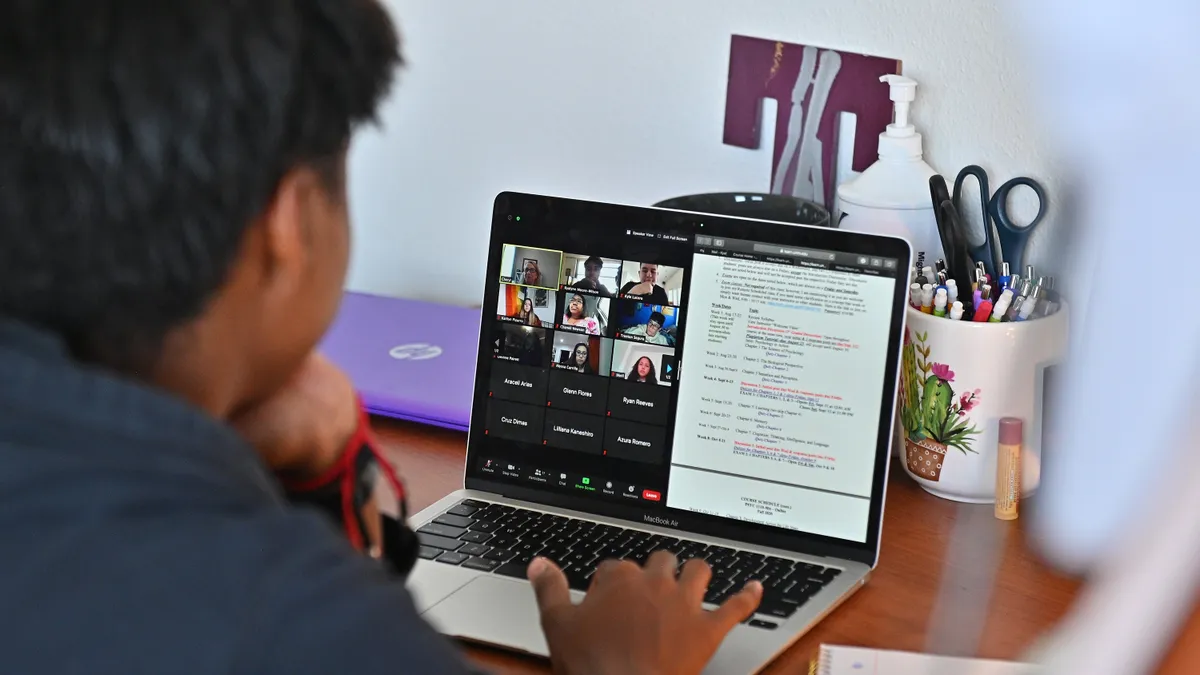Dive Brief:
-
The Program for International Student Assessment — a test of how 15-year-olds in the United States compare academically to their peers around the world — will for the first time test students' ability to engage in self-regulated learning while using digital tools in its 2025 assessment.
-
PISA is administered every three years and tests skills in reading, math and science. The new assessment, “Learning in the Digital World,” will also measure students' motivation and regulation while learning digitally, said Samantha Burg, U.S. national project manager for PISA and a research scientist for the Education Department's National Center for Education Statistics.
-
Although development for "Learning in the Digital World" began prior to the pandemic, a field test in 2024 and the official assessment in 2025 will come after an unprecedented time when students spent months — and in some cases entire school years — in remote learning.
Dive Insight:
PISA's new area of assessment examining how students engage with digital tools comes amid a dreary backdrop in education.
When schools shut down in-person learning due to the coronavirus pandemic, concerns arose about how much students were truly learning in front of a screen. At the same time, students reported running low on motivation, and academic engagement dropped.
The pandemic's negative impact on learning has since been well documented. Data from the Education Department showed sharp drops in both reading and math scores on the National Assessment of Educational Progress for grades 4 and 8 in 2022.
Another NAEP analysis, this one a 2022 long-term trend assessment for 13-year-olds, found students were not exhibiting signs of academic recovery following pandemic-induced learning lags.
And a separate federal survey of nationally representative public schools suggested that nearly half of students kicked off the 2022-23 school year behind grade level in at least one subject.
PISA 2025 will test science as its "major domain" — domains for the assessment rotate among science, math and reading every three years.
Testing learning in the digital world will for the first time supplement the major domain of study as an innovative domain. In addition to measuring students' motivation and self-regulation, it will also test how well students use digital tools to practice scientific inquiry, among other things. PISA launched in 2000 with the three major domains and in 2012 added an innovative domain.
"While not everyone will become software engineers, jobs of the future will increasingly require people to interact with computational models and simulated realities, and to solve problems using digital tools," says PISA's website. "Given the rapid rate of technological change, students today must develop a set of broad skills and perspectives that support lifelong learning in novel and unfamiliar digital environments."
PISA is coordinated by the Organization for Economic Cooperation and Development and conducted by NCES, which also oversees the National Assessment for Educational Progress.
PISA was last administered in 2022, and those results are anticipated to be released Dec. 5, said Burg. That exam, which focused on math along with a test of creative thinking, was postponed from 2021 because of the pandemic.
The most recent scores available now are from the 2018 assessment, which showed no improvement in U.S. student performance compared to 2015. While the U.S. rose in rank that year in comparison to other countries, it was because scores in other countries dropped.








 Dive Awards
Dive Awards







